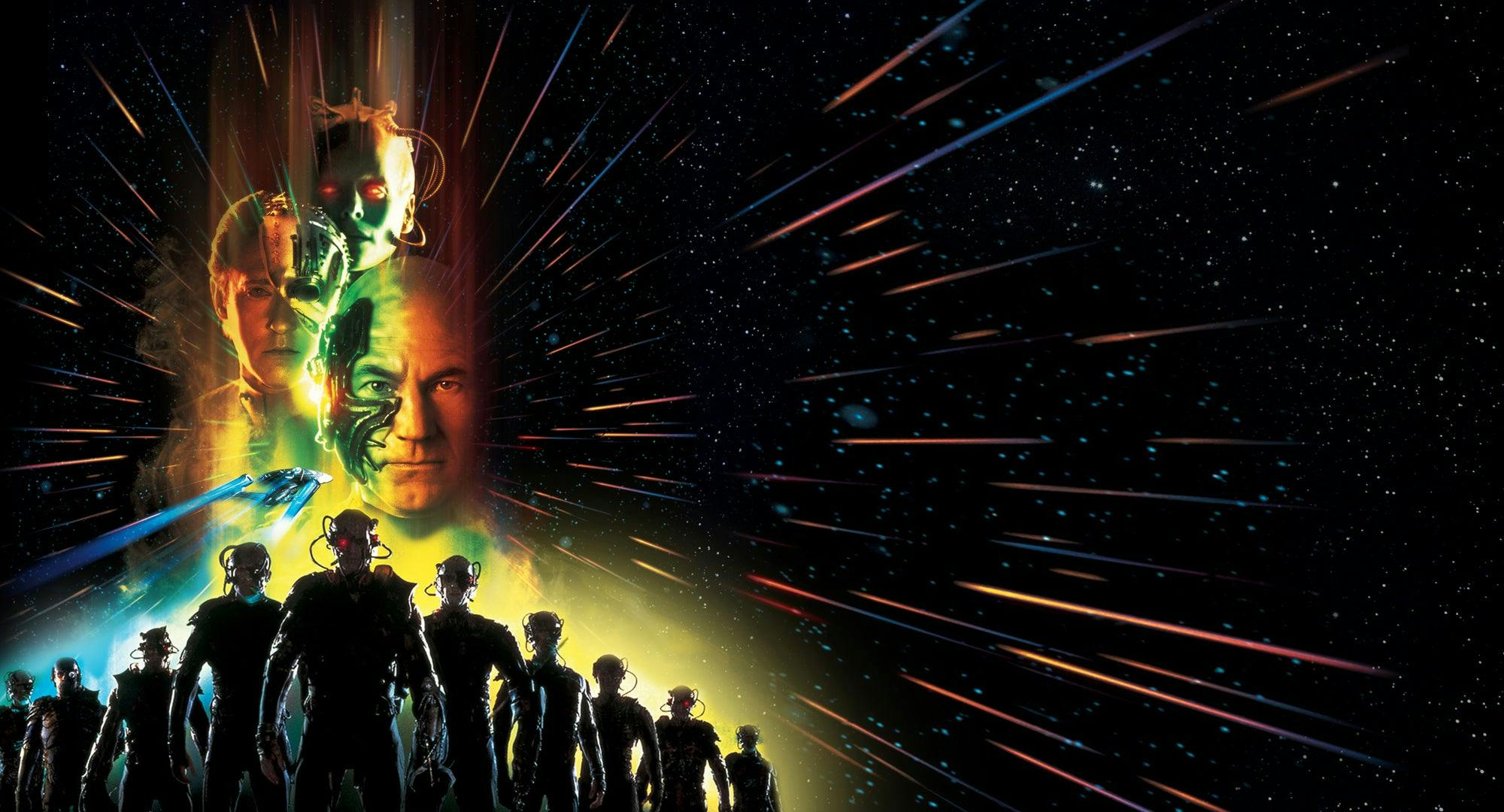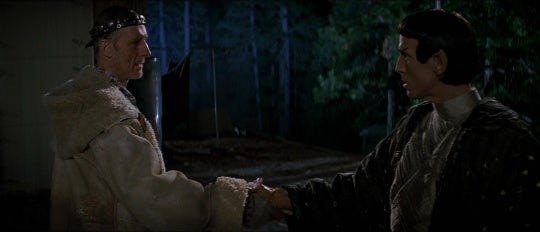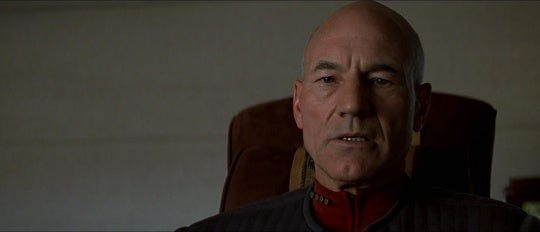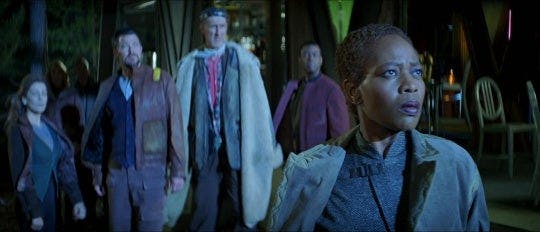Published Apr 4, 2021
How We Celebrated First Contact Day in 2020
"There’s no need to wait until 2063 to usher in a new era of human progress."

StarTrek.com
This article originally ran on First Contact Day 2020.
Technically, we won’t start celebrating First Contact Day until April 5th, 2063. According to Star Trek canon, that’s the day when Zefram Cochrane will launch Earth’s first warp-capable rocket, catching the attention of Vulcan researchers who heretofore dismissed our planet as too primitive to visit. Cochran’s voyage sets into motion events that not only lead to the creation of the United Federation of Planets, but also lead to the end of war, racism, and inequality on Earth.
Fans have been celebrating First Contact Day since the idea was introduced in the 1996 film, Star Trek: First Contact. Usually, celebrations focus on our enjoyment of all things Trek, with watch parties devoted to our favorite movies and episodes.

StarTrek.com
But this year, First Contact Day has to be more than that. First Contact Day 2020 might be the most important observance of the holiday because we’re celebrating it amidst a global pandemic.
As COVID-19 spreads across the planet, some Americans have responded with fear, by hoarding supplies and spreading misinformation. Too many, including those who refer to the virus as “the Chinese virus,” have used the outbreak as a reason to harm those of Asian descent. Too many Americans refuse to change their habits, still socializing, even though doing so increases the risk of infection for the elderly and the immunocompromised. Although the necessities of social distancing mean that April 5th, 2020 should be a no-contact day, we have an opportunity to enact ideas behind the holiday with our actions.
Fortunately, the movie that first introduced First Contact Day can provide inspiration. Directed by Jonathan Frakes, Star Trek: First Contact can be enjoyed as a simple sci-fi adventure. The movie sends the Next Generation crew back to April 4th, 2063 to protect Zefram Cochrane (James Cromwell) from time-traveling Borg. It features Picard and Worf gunning down Borg drones, Riker and Geordi joining Cochran on his inaugural trip (after some help by a comically inebriated Troi), and Data tempted to join the Borg Queen (Alice Krige).
First Contact is also about the horrors of assimilation. Like those responding to the pandemic with racism or refusing to change their behaviors, many of the film’s characters destroy those who are different and advance their way of life, despite the harm it causes others.
We see that attitude at work in the Borg. More than a mere zombie threat, the Borg represent security through sameness. Among the drones who invade the Enterprise are races who have fought against the Federation, such as Cardassians and Klingons. Within the Collective, they work alongside Starfleet crewmen. The drones feel completely safe with one another because they have erased all differences. Individual humans, Cardassians, and Bolians all blend together, their features diminished by sickly gray skin and nondescript black uniforms.

StarTrek.com
The Enterprise crew initially acts in a similar manner, fighting the Borg by giving in to their fear. Traumatized by his own assimilation into the Collective (as told in the TNG episodes “The Best of Both Worlds, Parts I and II”), Picard continuously puts his crew at risk to destroy his enemies once and for all. Intimidated by the hero that Geordi and Barclay expect him to be, Cochrane runs away from his destiny. Scared to lose the human skin that the Borg Queen has given him, Data considers betraying his fellow crewmen.
To those watching First Contact in 1996, our heroes’ choices seem like mere dramatic tension. Audiences are pleased, but not particularly shocked, when Riker convinces Cochrane to launch his rocket or when Data’s apparent betrayal turns out to be a ruse. But the victories of Picard and his crew have more weight in 2020 when so many indulge their fear. The Borg become a more realistic villain when so many Americans abandon their Asian-American neighbors and rally around those who seem similar.
But First Contact also gives us a model for resisting fear, in the form of Cochrane’s partner Lily (Alfre Woodard). Beamed to the Enterprise sickbay to be treated by Dr. Crusher, Lily must not only make sense of technology from 300 years in the future, but must also face alien races that she’s never seen or imagined. And yet, she still has the wherewithal to stay with Picard as the Borg overtake the Enterprise, and to even rebuke his self-destructive pursuits.

StarTrek.com
It’s her bravery that keeps the story going forward, something Frakes acknowledges with his direction of the climactic scene. After the Borg have been defeated and Cochrane’s launch a success, Vulcans land at the launch site. On Riker’s urging, Cochrane goes forward to greet the Vulcans, but before he does, Lilly reaches out to take his hand.The camera lingers for a moment on the contact she made, on the intertwined hands of two different human races setting the stage for the cosmic event about to happen.
This First Contact Day, none of us will meet a crew of alien time-travelers, but we will be dealing with coronavirus. Lily reminds us to be brave during the pandemic. Instead of reverting to our old ways, we can do the hard thing and stay home as much as possible. Instead of hoarding supplies, we can refuse to participate in factionalism and leave goods for others. At the very least, we can respond to differences by refusing fear and rejecting racism wherever we see it.
There’s no need to wait until 2063 to usher in a new era of human progress. We can do it in 2020 if we only remember the lesson of First Contact, that difference makes us better and that assimilation is destruction. Let’s use this First Contact Day to overcome our pandemic fears and improve our world now.
Joe George (he/his) writes about pop culture for outlets such as Tor.com, Bloody Disgusting, and Think Christian. He collects his work at joewriteswords.com and tweets from @jageorgeii.

